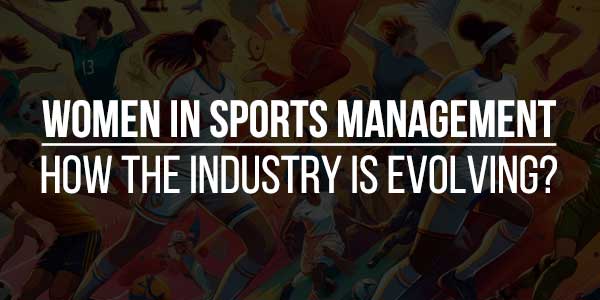
The world of sports management has been majorly dominated by males if we look from a historical perspective. The role of women in sports was just limited to athletics.
However, a gradual shift has been seen in the past few years with more women venturing into the field of sports. This evolution is not only about gender equality but also about acknowledging the value that women bring to this industry.
In this blog, we learn more about the evolution of women in sports management, the challenges they are facing and the strategies taken to bring more inclusivity in the field.
Table of Contents
A Historical Overview:
Even though many trailblazers like Billie Jean King, Kathrine Switzer, Megan Rapinoe & many other women fought for equal opportunities in sports, the sports arena remained male-dominated for many years in the past. Women often ended up in support jobs or office work seldom rising to spots with power and sway.
As an example, let us take the case of American Tennis pioneer Billie Jean King. When she won her first Wimbledon in 1966, King received less pay than half of what her male counterparts received.
At the beginning of the late 1970s, King began her fight demanding equal pay for women in sports. She led the charge for equal pay in women’s tennis with highly publicized protests, including barricading herself and 63 other tennis players in a hotel to form the Women’s Tennis Association.
Factors Driving A Favorable Change
With the many ongoing efforts to break the stereotyping and gender bias, women are likely to find better opportunities and inclusivity in the sports arena.
With many new supportive measures like mentorship programmes and DEI initiatives, sports organisations can encourage women to actively participate in events and sports business.
Over the last few years, various factors have contributed to the increasing presence of women in sports management.
Changing Views Of Society:
Society’s attitude towards gender roles is shifting gradually and we can see an increase in support initiatives for women in the workplace including the sports sector.
Research proves that women have powerful leadership traits. These include the ability to understand others’ feelings, work well with teams, and think ahead. These qualities are required to thrive in the field of sports management.
CSR & Diversity Initiatives:
Many sports organizations & corporations are now focusing on diversity and inclusion in their business practice. They’re making a real push to hire and promote more women into leadership roles.
Professional Development Programmes:
As women’s role in sports gains popularity, there is a growing need for skilled women professionals in sports management. Various sports education and training programmes are there now to empower women to grasp these key skills needed to succeed in this industry.
Women can take advantage of offline and online courses in sports management offered by reputed universities to kick off a rewarding career in sports.
Mentorship & Sponsorship:
Apart from these factors, different types of mentorship and sponsorship programmes in sports management aim to give guidance and career support to women. For example, organisations like Women Leaders in College Sports (WLCS), Women National Basketball Association, Women Sports Foundation, etc support and encourage women who are passionate to become leaders in the sports industry. This has opened the door for more women to enter leadership positions.
Common Challenges For Women In Sports Management:
Despite many advancements, women in the sports field continue to face various challenges.
Gender Bias & Stereotype:
Gender bias remains a serious concern for women in the sports industry. Often women face stereotyping concerning their competence and leadership capabilities. Many women working in the sports sector are not receiving the recognition and financial benefits they deserve.
Work-Life Balance:
Working in the arts field is no easy job as it comes with more responsibilities and time away from work. Thus sports management roles often make it tough for women to maintain a healthy work-life balance. Women with children and family responsibilities find it challenging to meet their career goals and ambitions.

Lack Of Managerial Opportunities:
Women often face difficulty finding good mentors and sponsors to help with their sports management careers. They are not given leadership opportunities and promotions in their job roles. They need the right mentorship and career guidance to build skills and confidence to move ahead in their careers.
Success Stories Of Women In Sports:
Let us look at some success stories that underline the potential of women’s participation in sports management.
Ellie Norman: Marketing Innovator In Motorsports:
Ellie Norman has contributed immensely to motorsports marketing as CMO for Formula E and formerly for Formula 1.
Among the myriad of contributions toward global branding efforts for said racing series, hers exhibited vast innovative strategies focused on sustainability and inclusivity.
Norman’s work affirms how women can drive transformative advancement within high-profile sports organizations by leveraging their unique perspectives and expertise.
Kim Ng: A Trailblazer In the American Baseball League:
In 2020, Kimberly J Ng scripted history when she was selected as the general manager of the American baseball league Miami Marlins. She became the first woman to take up the role of a GM in any of the American men’s sports teams. Her career in sports began as an intern with the Chicago White Sox in 1990.
Ng has been associated with many other popular teams like New York Yankees & Los Angeles Dodgers. She’s been the vice president for two teams and worked as a senior executive in MLB.
She has vast experience in the field, especially with player development and operations. She had been an advocate for women in sports and stressed the importance of having women in such leadership roles.
What The Future Holds? Women In Sports Management:
Getting to gender equality in sports management has been a tough road. But in recent years, we’ve seen real progress. The days ahead seem to be promising for women in sports management.
Women can give their best in the sports industry if they get peer support, mentorship, and encouragement from organisations. This will lead to a fairer future for all who are working in this field.
Sports groups or companies focusing on diversity, equity, and inclusion (DEI) efforts tend to experience good results. Studies show that teams with different backgrounds make better choices and boost financial results.
More and more women are taking up leadership positions inspiring future generations to follow suit. Moreover, educational pathways such as a higher national diploma in sports management are becoming popular and accessible for women aspiring to become leaders in sports.

 About the Author:
About the Author:
















Be the first to write a comment.